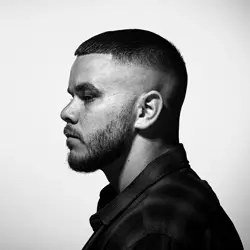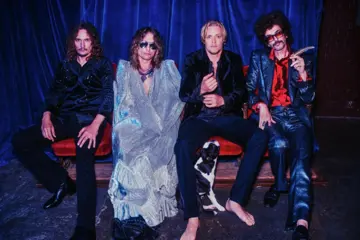 Tasman Keith
Tasman KeithTasman Keith won’t require an introduction for much longer. He is a singular talent with a distinctive voice – both in vocal tone and songwriting chops – and the songs to back him. The 26-year-old Gumbaynggirr man burst onto Australia’s rap scene in 2017 with his debut single, Might Snap, which received significant airplay and critical acclaim. Since then, Keith has put out a string of impressive EPs, kicking things off with Mission Famous in 2018, Evenings, his collaboration with Stevie Jean in 2019, and To Whom It May Concern in 2020. He’s been dubbed “Bowraville’s own Kendrick Lamar” by triple j, who also awarded him Australian Music Video of the Year for Billy Bad Again in 2020.
His non-EP singles, like fan favourite No Country (Piano in F Minor) feat. Kuya James, are just as essential listening. Also, in 2020, Keith worked with Midnight Oil – an experience he remains humbled by and “did not expect in the slightest” – with his verse on First Nation proving to be one of The Makarrata Project’s most stirring moments. Keith is preparing to unveil his stunning debut album, A Colour Undone, to the world, a record that stretches beyond genre categories and our wildest expectations.
Recorded in Alex The Astronaut’s studio in Marrickville, Keith and his team locked themselves in the tiny room for six days. An album created by a village and inspired by community, a break-up, duality of personas, and detailing a spiritual journey that explores the suffering of an Indigenous man in Australia, A Colour Undone delivers messages of hope and loving others. “I love the record,” he smiles. “The job I did with this record is fulfilling for me. I wrote this record for myself and the listener. I hope that it connects with the audience, and I believe that it will connect, but I don’t completely expect it to.”
Keith doesn’t have a one-size-fits-all approach to songwriting. “With some of the more rap joints, I can simply have that done, you know, in a day or a week,” he shares on Zoom from his car in Sydney. “But with songs like No Country, that was something I was sitting on for like two years, and just had the second verse empty. So, I just know I needed the space to think more about what I wanted to say and go through some things. And once I did, I could write a song like that. So, it just varies and depends.” Other songs, such as HEAVEN WITH U feat. Jessica Mauboy and LOVE TOO SOON, were written on the same day.
Don't miss a beat with our FREE daily newsletter
One of the joys found within A Colour Undone is its sequencing, which balances hip hop in the vein of industry veterans, journeys into soul music, and some massive pop bangers. It’s something that came naturally for Keith and his collaborators. “We would write a song every day,” he begins. “And then we'll, you know, try and make the tracklist as we're going along. We'd be like, ‘Okay, we made this song. I feel like this one should come second on the record. And then we'd have a song that has come sixth and seventh. So, [sequencing the album] was really like a puzzle. Once we got to the point of knowing what I wanted to do, it was easier to know where I wanted the album to go.”
An artist packed with self-awareness on a mission to find clarity, Keith never truly feels like he’s “fully grown” – something more of us should admit to ourselves. “There are always things that people need to work on. So, I never think I'll get to the point where I'm like, ‘Okay, I'm all the way there.’ And I'm definitely open to growing more and learning every day. But compared to the timeframe of, you know, when I wrote and who I wrote [my earliest] songs about and that point in my life, 100% I’ve grown.”
Some of the best songs about heartbreak, loss, and loving someone – universal themes – are songs Keith manages to write out of nowhere. And somehow, he can meld those themes with the slickest beats and unrivalled confidence. “I pull from personal experiences to make those tracks easier to write,” he says. “So, it’s a balance that I’ve always been able to find.” On A Colour Undone, his collaborators, Genesis Owusu, Phil Fresh, Kwame, Jessica Mauboy, and others, all complement each other and make their respective tracks feel richer.
“What I've always gotten from Phil Fresh and Kwame is just a sense of pushing each other creatively,” he starts. “Every artist on the record really brought their all to it. And what I learn from every artist is gaining a different experience. Those people have lived life differently than I have, as everybody has and does. So, to have, you know, their perspective on a topic that I may have brought up is quite interesting.” Keith couldn’t be more on the money. Each track with a guest vocalist inspires something new, with Genesis Owusu bringing the heat on CHEQUE.
“It was great to hear him rap, you know?” he laughs. “I called him when I had the record and said, ‘I got some good some shit for you to rap on. You know, I want you to talk your shit.’ And he's like, ‘I've got some shit to say.’ And then he pulled up the studio and laid it down. And I'm like, yep, talk it. And it's great to hear him get that off his chest.” All these rich collaborations lead us to segue back to Midnight Oil, which sees Keith flustered for the first time.
“Growing up and making music, you reach for the stars,” he says. How many Australian artists dream of following in the Oils’ footsteps? Keith concurs, “I still am reaching for the stars. But that collaboration was one thing I did not have in mind. So, it took me back a bit when that came up. I also was thankful for the opportunity and ensured that once I was in that session with those guys, I wasn't too in my head about writing a song. No, I just went in there and did what I do best.”
Music has always been integral to Keith’s life and community. As the son of the pioneering rapper Wire MC, he appeared on stages beside his father at age eight and began writing his own lyrics. His parents set no expectations of him and instead encouraged freedom of expression. His mother would play the classics by Prince, Lauryn Hill, Amy Winehouse and more while doing the household chores. “I remember when I moved back to Bowraville when I was 14, there was this community centre. Having that space allowed me to do in there every afternoon and write regardless of pressures to work on my craft or write a great song,” he shares. “I could just go there and have fun writing, rapping, and recording myself with my cousins and friends.”
Now, Keith is giving back to his community, spearheading the intensive project Subtext: Art for Literacy at MacLeay Valley Vocational College in Kempsey with the Australia Literacy and Numeracy Foundation. “[Kempsey] is a community much like my own. Connecting with these young adults and helping them find their voice through creativity and music isn’t something I can take for granted, and it’s as fulfilling for me as it is for them.”
“There are kids in that school from all different walks of life,” he continues. “They’ve struggled to get an education in the schooling system, and this vocational college is likely their last chance. To be in there with kids of different races, different colours, different backgrounds, different upbringings, and different family problems with the love of music and writing is incredible.”
On how the Australian music industry, including music journalists such as myself and publications such as this one, and governments can improve representation, arts in schools, and opportunities for hip hop artists, Keith believes that we need to continue listening to people and seeing what needs to be done. “Artists are already working hard to build the spaces we want to see in the world,” he says. “It’s obvious that there’s an audience in Australia for hip hop and other diverse music, and they’ve been waiting for something to connect with.”
“I think what you’re doing, as a journalist, is creating a space and having a conversation.” Keith, clearly an empathic person with a keenness for learning more about himself and others, ends our chat with a call for listening to one another. “You know, I'm sure there are things in your life that I wouldn't understand, but I think if we all take the time to break down stigmas or taboos and just do things that feel right and not wrong and get back to the conversation and just talking with people and understanding people on all levels, that’s what should happen.”















